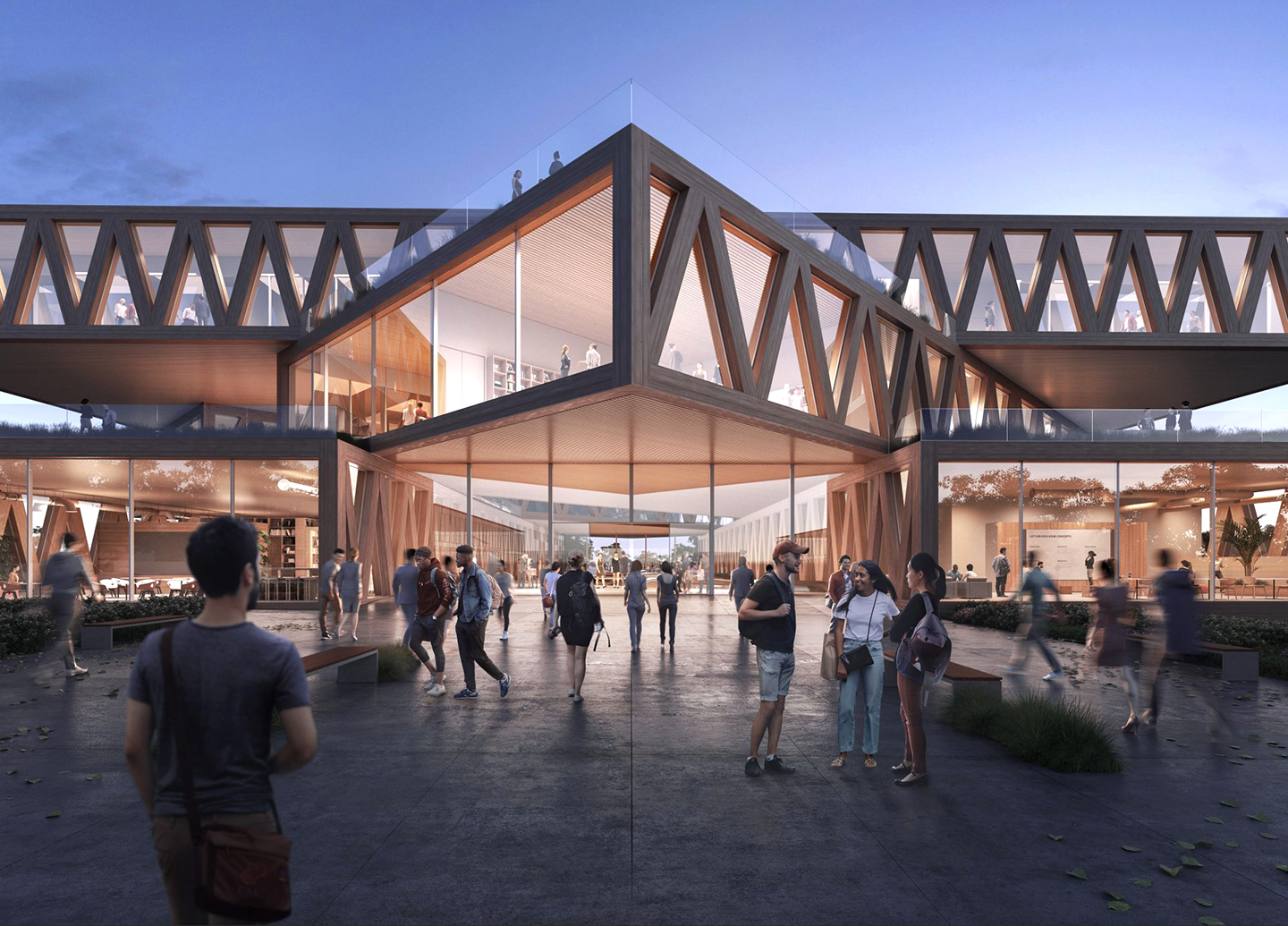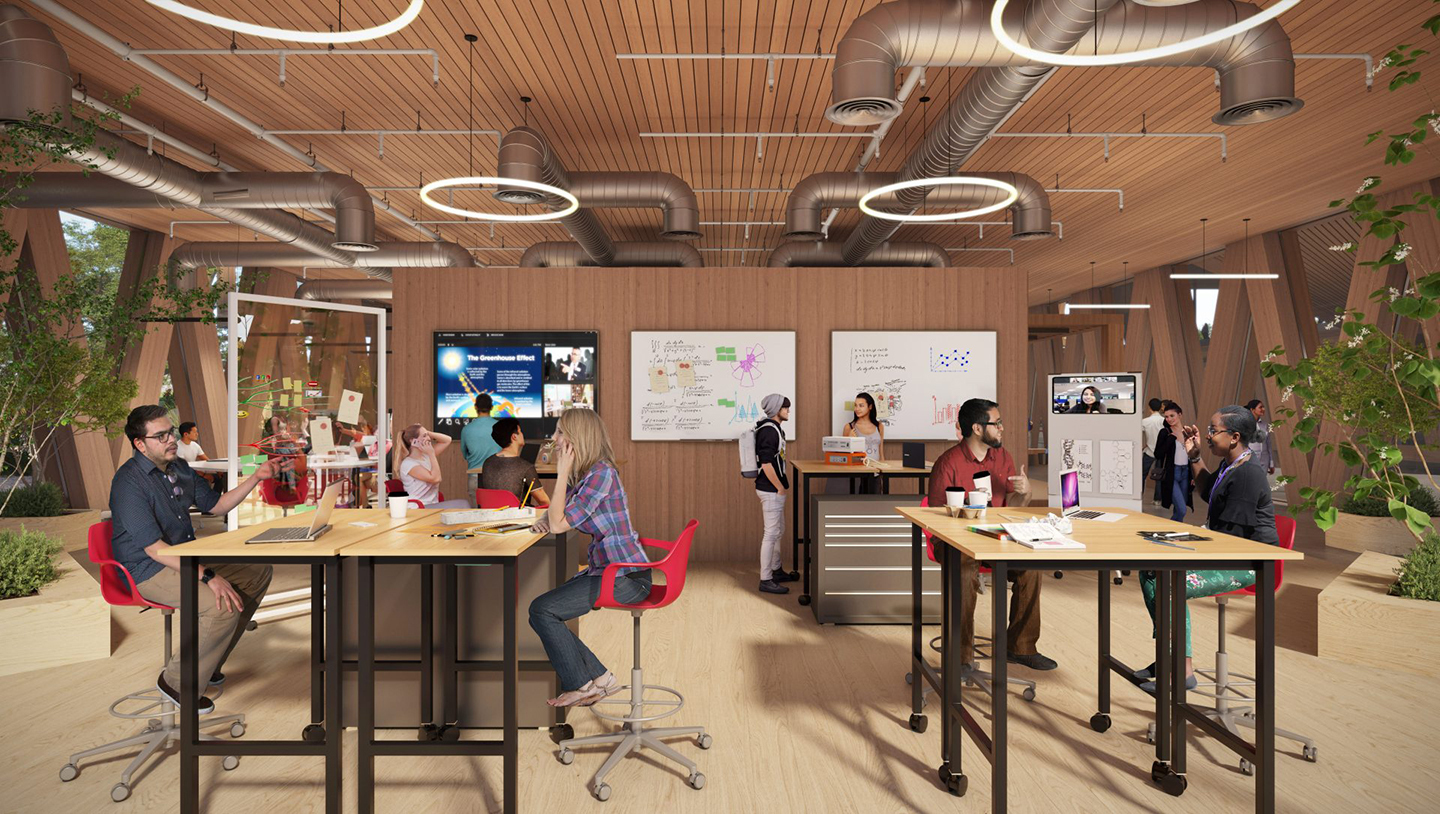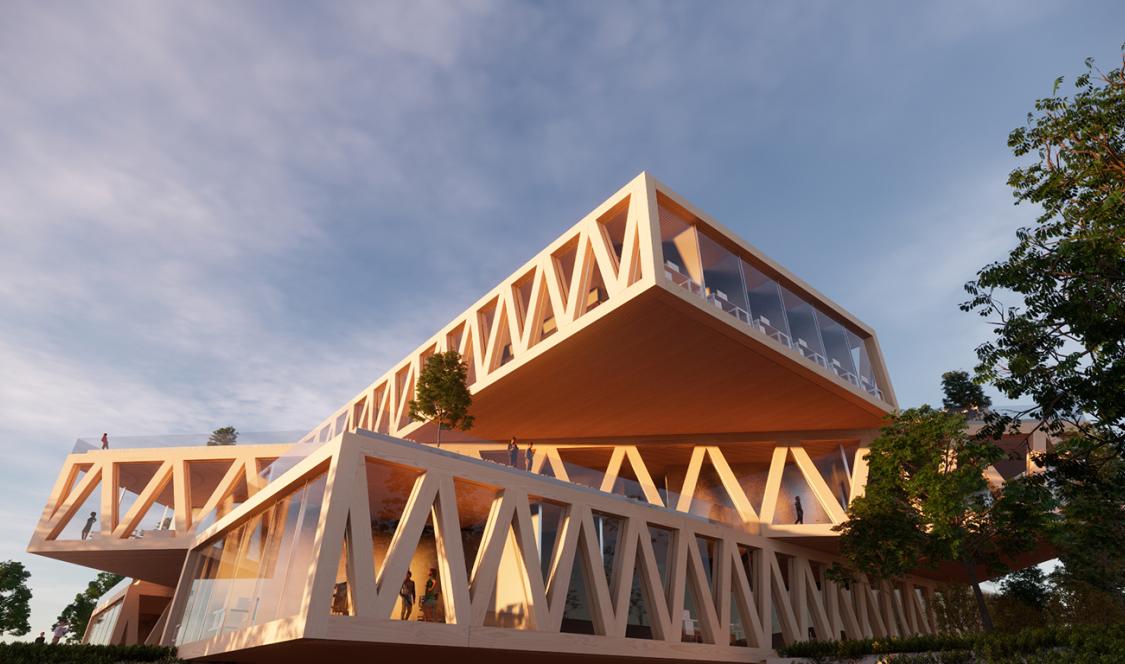Exploring Our Future
To learn more about CMC’s Integrated Sciences Plan, visit our First Look microsite for a video on the new program, along with design concepts of the center.
At CMC’s Board of Trustees dinner (Sept. 30), President Hiram E. Chodosh gave a group of roughly 100 faculty, staff, students, alumni, and trustees a first look at the College’s conceptual plans for a new integrated sciences center—a seminal investment and commitment that infuses science and computation deep into the fabric of the CMC mission and campus.
The conceptual plan will provide the home for CMC’s next generation integrated sciences program. Rooted in The CMC Strategy, approved by the Board in April 2019, the new department will integrate and expand the sciences, including computer and data science, and build close collaborations with CMC departments and programs in the social sciences and the humanities.
The College has not yet reached its final fundraising targets for fully greenlighting the program and center; however, it has made outstanding progress in recent months, said David Mgrublian ’82 P’11, Chair of the Board of Trustees.
“We will need an all-in commitment by every member of the CMC community to meet our targets, and I am incredibly confident about our ultimate success,” Mgrublian said.
Led by CMC’s Founding Chair for Integrated Sciences, Dr. Ran Libeskind-Hadas, the new department and program will focus on grand challenges in emerging scientific exploration, discovery, application, and critically important intersections with economics, policy, ethics, and other central issue-areas of our time.
Broad interdisciplinary themes under consideration include:
- Genomics, Systems Biology, and Health—the exploration of molecular sequence data to understand the function of genes and the use of genomic data and analysis to build models of predictive biological systems for human health;
- Brain, Learning, and Decision Sciences—the understanding of mental processes, behavior, and decision making, including aspects of neuroscience, cognitive science, artificial intelligence, and machine learning; and
- Climate, Energy, and the Environment—a focus on atmospheric processes, the chemistry, physics, and biology of climate change, and the interactions of human activities and the natural and built environments.
In 2019, the CMC faculty developed and approved the academic vision for the new department to include several key components.

- An integrative approach. Modern scientific research increasingly stretches across disciplinary boundaries and should be designed with pedagogy, curricula, and research opportunities to prepare students to work in cross-disciplinary environments. The department’s design as a single, integrated program, with fewer barriers to interdisciplinary and multidisciplinary scientific collaboration, will boost the capacity for this preparation. The department’s underlying commitment to the core disciplines of biology, chemistry, environmental analysis, neuroscience, and physics will strengthen this approach.
- A computational, data science based curricular core. The program will provide rigorous training so that all graduates acquire proficiency in a broad array of quantitative skills, including scientific programming, statistics, computer science, data analysis and visualization, and computational methods. Beginning in a student’s first year, computational approaches will be integrated throughout the curriculum.
- Emphasis on “science in the public sphere.” Science education requires understanding the societal impacts of scientific research and the ability to communicate the significance and implications of that research to a broader public. Accordingly, both science and non-science majors will receive essential preparation to actively engage with public policy, public affairs, industry, education, government, and health. This training will be fostered by curricular offerings in transdisciplinary fields and/or majors, such as biotechnology, the environment, health and human systems, applied quantitative modeling and computation, science management, scientific entrepreneurship, and management engineering; preparation in public speaking and written communication; and courses for majors and non-majors that build bridges to social sciences and the humanities.
- Student research opportunities. As teacher-scholars, the CMC faculty recognize the importance of undergraduate research as a distinctive component of a student’s scientific training, separate from yet complementary to regular coursework. Multiple opportunities for conducting original research should be provided via course design, internal and external internships, senior thesis work, student-faculty collaborations, and commercial and institutional partnerships.

The current concept of the center by BIG-Bjarke Ingels Group, world-renowned, award-winning architects, designers, builders, and thinkers based in Copenhagen, New York, and London, matches the ambition of the program.
Walking into the first level of the building, students will enter a full-height atrium and spaces that facilitate collaborative activity throughout. Other envisioned spaces include the Workshop, the Innovation Hub, and the Agora, high-trafficked areas for study, group projects, multi-disciplinary maker spaces, presentations, and virtual convenings, as well as classrooms and offices for CMC institutes, centers, and labs. Recognizing that the new center will be used by the entire campus for extended hours, the design anticipates a café and many public gathering spaces on the ground level, as well.
The two parallel stacks on the first floor are rotated by 45 degrees in levels two and three, respectively, and will house teaching and research labs, all flexibly designed to adapt to multiple uses, as well as offices for faculty. Plans also call for both levels to benefit from terraces that allow easy access to the outdoors, visibility to the main atrium, plenty of natural light, space for public art, and multiple independent and group gathering spaces.
Located on the northeastern corner of the campus, the center will create a strong presence on Claremont Boulevard, while triggering a series of developments and improvements for an expanded east campus to prepare CMC for the next chapter in its 75-year story, Chodosh said.

Over the next few days, the College will hold introductory sessions for faculty, staff, students, as well as alumni and parent volunteers during the upcoming ImpactCMC weekend to provide ideas and input. The feedback and design process will continue for the next several months.
“Transformational programs require equally powerful facilities,” Chodosh observed. “The new integrated sciences program is designed to prepare our students for what we all need from them—responsible leaders who are able to address the most complex problems at the intersections of science, computation, business, policy, ethics, and society, and who are committed and prepared to collaborate on the most innovative solutions.”

